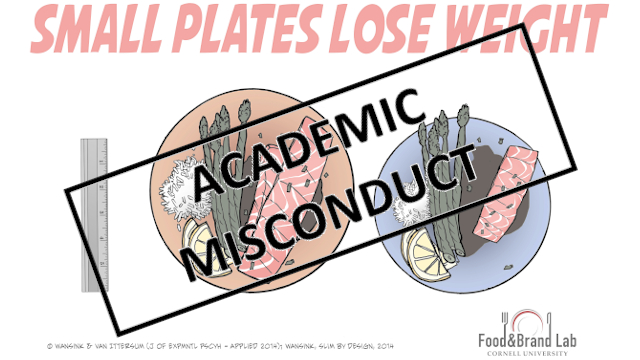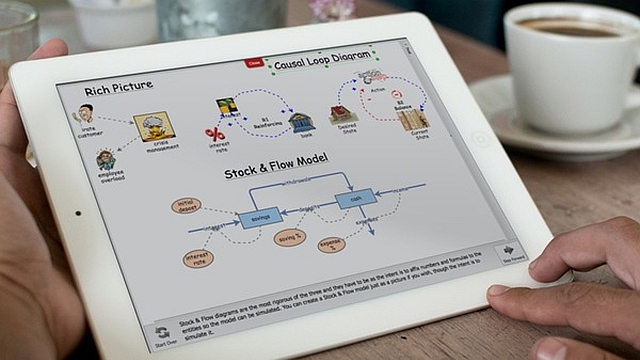
Simplistic solutions to complex problems turns behavioural science into a dangerous pseudoscience (part 3): Why it’s dangerous
This three-part series critiques the research of discredited high-profile Cornell University food researcher Brian Wansink from a complexity point of view.
In the first part of this series, I look at the deeper issue underlying the recent academic misconduct finding against high-profile Cornell University food researcher Brian Wansink. I argue that the real problem is that Wansink put forward simplistic solutions that ignored the complex reality of the health issues he was seeking to address, and the only way he could get these solutions to appear to work was through engaging in inappropriate practices.
Then in the second part, I look at how advancing simplistic solutions in ignorance of complexity and compounding this ignorance through confirmation bias turns behavioural science into a pseudoscience.
In this third and final part of the series, I’ll show that this is dangerous because of the negative consequences that result from simplistic solutions to the complex chronic health issue of obesity.
Why it’s dangerous
Cornell University announced on 20 September 2018 that a faculty committee had found that Brian Wansink had “committed academic misconduct in his research and scholarship.” At that time, 13 papers that included Wansink as an author had been retracted. Since then, further retractions have brought Wansink’s tally to 17.
Bad science like that published by Wansink erodes public confidence in science1, and this in turn undermines evidence-based management2.
But in advancing simplistic solutions to chronic health issues such as obesity and diabetes, Wansink’s pseudoscientific behavioural science research has potentially done a lot more harm than just diminishing the credibility of science.
The World Health Organisation (WHO) alerts that obesity has reached epidemic proportions globally, with former WHO Director Margaret Chan advising3 that since 1980, obesity has more than doubled around the globe, and it’s estimated that the number of adults living with diabetes has almost quadrupled.
As well as serious health impacts4, obesity has significant economic costs5 including the expenses associated with physician visits, inpatient and outpatient care, medication, and hospitalisation. Adding to these costs, governments have responded to the obesity epidemic by spending large amounts of money on public health campaigns. However, these campaigns have had little overall effect on the rising rates of obesity. A 2014 analysis6 by McKinsey Global Institute reports that:
More than 2.1 billion people – close to 30 percent of the global population – today are overweight or obese. That’s nearly an estimated two and a half times the number of people in the world – adults and children – who are undernourished. And the obesity problem is getting worse, and rapidly. If the growth rate in the prevalence of obesity continues on its current trajectory, almost half of the world’s adult population is projected to be overweight or obese by 2030.
This has huge personal, social, and economic costs. Obesity is responsible for around 5 percent of all global deaths. The global economic impact from obesity is roughly $2.0 trillion, or 2.8 percent of global GDP, roughly equivalent to the global impact from smoking or armed violence, war, and terrorism
As well as having had little overall effect on the rising rates of obesity, the public health campaigns have resulted in serious unintended consequences. In a 2015 commentary7 in the Canadian Journal of Public Health, Ximena Ramos Salas of the Centre for Health Promotion Studies at the University of Alberta states that:
The public health war on obesity has had little impact on obesity prevalence and has resulted in unintended consequences. Its ineffectiveness has been attributed to: 1) heavy focus on individual-based approaches and lack of scaled-up socio-environmental policies and programs, 2) modest effects of interventions in reducing and preventing obesity at the population level, and 3) inappropriate focus on weight rather than health. An unintended consequence of these policies and programs is excessive weight preoccupation among the population, which can lead to stigma, body dissatisfaction, dieting, disordered eating, and even death from effects of extreme dieting, anorexia, and obesity surgery complications, or from suicide that results from weight-based bullying.
Ximena Ramos Salas goes on further to criticise the current focus on simplistic policies, programs, and messages, and then recommend that the complex drivers of obesity be considered. She states that:
Simplistic obesity public health policies and programs that are only evaluated against changes in body weight or BMI are ineffective and can have unintended consequences. Public health professionals need to be more critical of current obesity narratives (which can cast shame and blame on individuals with obesity) and avoid simplistic obesity messages that focus solely on individuals’ responsibility for weight and health. Public health should address the complex drivers of obesity by focusing on both individual-level (behavioural, psychological, and early life factors) and system-level (socio-environmental) determinants of health.
Ximena Ramos Salas’ warnings of the negative consequences of simplistic approaches to the complex issue of obesity very much align with the criticisms I make of Wansink’s behavioural science research in part 1 and part 2 of this series. Dr Jane Mulderrig, a lecturer in applied linguistics at the University of Sheffield, goes further by directly alerting to the dangers of behavioural science “nudge” approaches to addressing obesity. In a 2017 paper8, as also reported in an associated article9, Mulderrig critiques the UK government’s ‘Change 4 Life’ social marketing campaign which was designed to nudge people towards making healthier lifestyle choices in relation to diet and exercise.
Mulderrig refers to the 2007 UK Government Office of Science Foresight Program report Tackling Obesities: Future Choices – Obesity System Atlas10 that I discussed in part 1 of this series, stating that:
The analysis [in Mulderrig’s paper] … demonstrates that the government recognises the complex social, economic and commercial factors which correlate with increasing obesity (Foresight 2007), and yet it obfuscates this causal complexity in favour of a simplified behaviour-change message, leaving market freedoms largely unchallenged.
Further, the associated article states that:
Jane Mulderrig [argues that] behavioural economics is a poor substitute for radical state intervention that would address the root causes of obesity – such as poverty, the availability of cheap junk food and inadequate public transport. Instead, Change4Life’s advertising subtly evokes northern, working-class families and plays on parental guilt using dubious science.
Simplistic obesity messages focusing solely on individual responsibility for weight and health have led to a widespread perception that all that obese people need to do to lose weight is eat less and exercise more. This has led to obese people being stigmatised11, which manifests as discrimination, social isolation, teasing, and bullying. As well as leading to reduced education, career, and economic opportunities, weight stigma has serious health impacts:
Based on studies published to date, weight stigma clearly matters for health. For one, it changes health-relevant behaviors for the worse. For example, feelings of weight stigma trigger disordered eating and exercise avoidance — even when people are desperately trying to lose weight. Feelings of being judged as “fat” are highly emotionally distressing in themselves, and accordingly weight-related stigma predicts higher risk of depression, anxiety, and suicidality. The stress effects of the stigma also likely places people at greater risk of inflammation and chronic disease, as does living with other forms of overt discrimination.
It’s not just the general public that stigmatises obese people. Obesity stigma also exists in healthcare settings, and, worryingly, this causes obese people to disengage with healthcare providers12.

I’ve personally witnessed a horrific example of obesity stigmatisation. While working on the Land & Water Australia (LWA) Knowledge for Regional Natural Resource Management (NRM) Program in 2006-2008, I participated with my LWA colleagues in a number of conferences throughout Australia. At a participant dinner for one such conference, a colleague related their experiences of a long walk the evening before to our table group, prompting a discussion about exercise and health. During the discussion, one of the others in the table group made the comment “What about Professor Peter Cullen, how could an educated man like him let himself go like that?” which was then endorsed by most of those at the table.
The late Professor Peter Cullen was a leading Australian water scientist. He was very highly regarded and respected, receiving many accolades and honours including the Australian Prime Minister’s Prize for Environmentalist of the Year in 2001. That such a learned person could suffer weight problems should have indicated to my table companions that the issue is a whole lot more complex than their simplistic notions of eat less, exercise more. So I was completely astounded and deeply disappointed that they drew the conclusions that they did. Peter’s weight may well have contributed to his early death in 2008, but nobody did him any favours by stigmatising him for his weight.
The responsible thing to do is recognise the complexity of obesity and take a scientific approach13 to understanding and addressing it.
Header image source: Small Plates Lose Weight is licensed under CC BY-NC-ND 4.0.
References:
- Saltelli, A., Ravetz, J. and Funtowicz, S. (2016). Who will solve the crisis in science? In A. Benessia et al. The Rightful Place of Science: Science on the Verge. Tempe, Arizona: Consortium for Science, Policy & Outcomes. ↩
- Rynes, S. L., Colbert, A. E., & O’Boyle, E. H. (2018). When the “best available evidence” doesn’t win: How doubts about science and scientists threaten the future of evidence-based management. Journal of Management. doi 10.1177/0149206318796934 ↩
- Chan, M. (2017). Obesity and Diabetes: The Slow‐Motion Disaster. The Milbank Quarterly, 95(1), 11-14. ↩
- Kopelman, P. (2007). Health risks associated with overweight and obesity. Obesity reviews, 8, 13-17. ↩
- Tremmel, M., Gerdtham, U. G., Nilsson, P. M., & Saha, S. (2017). Economic burden of obesity: a systematic literature review. International journal of environmental research and public health, 14(4), 435. ↩
- Dobbs, R., Sawers, C., Thompson, F., Manyika, J., Woetzel, J. R., Child, P., … & Spatharou, A. (2014). Overcoming obesity: an initial economic analysis. McKinsey global institute. ↩
- Salas, X. R. (2015). The ineffectiveness and unintended consequences of the public health war on obesity. Can J Public Health, 106(2), e79-81. ↩
- Mulderrig, J. (2017). Reframing obesity: a critical discourse analysis of the UK’s first social marketing campaign. Critical Policy Studies, 11(4), 455-476. ↩
- Mulderrig, J. (2016). Fat-shaming: Change4Life’s anti-obesity ‘nudge’ campaign glosses over social inequalities. Democratic Audit UK. ↩
- Vandenbroeck, P., Goossens, J., & Clemens, M. (2007). Tackling Obesities: Future Choices. Obesity System Atlas. Department for Innovation, Universities and Skills. ↩
- Brewis, A., SturtzSreetharan, C., & Wutich, A. (2018). Obesity stigma as a globalizing health challenge. Globalization and health, 14(1), 20. ↩
- Fruh, S. M., Nadglowski, J., Hall, H. R., Davis, S. L., Crook, E. D., & Zlomke, K. (2016). Obesity stigma and bias. The Journal for Nurse Practitioners, 12(7), 425-432. ↩
- Ramalingam, B., Jones, H., Reba, T., & Young, J. (2008). Exploring the science of complexity: Ideas and implications for development and humanitarian efforts (Vol. 285). London: ODI. ↩






